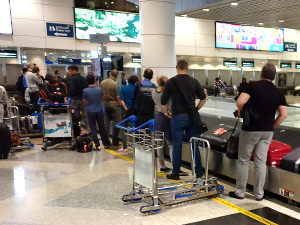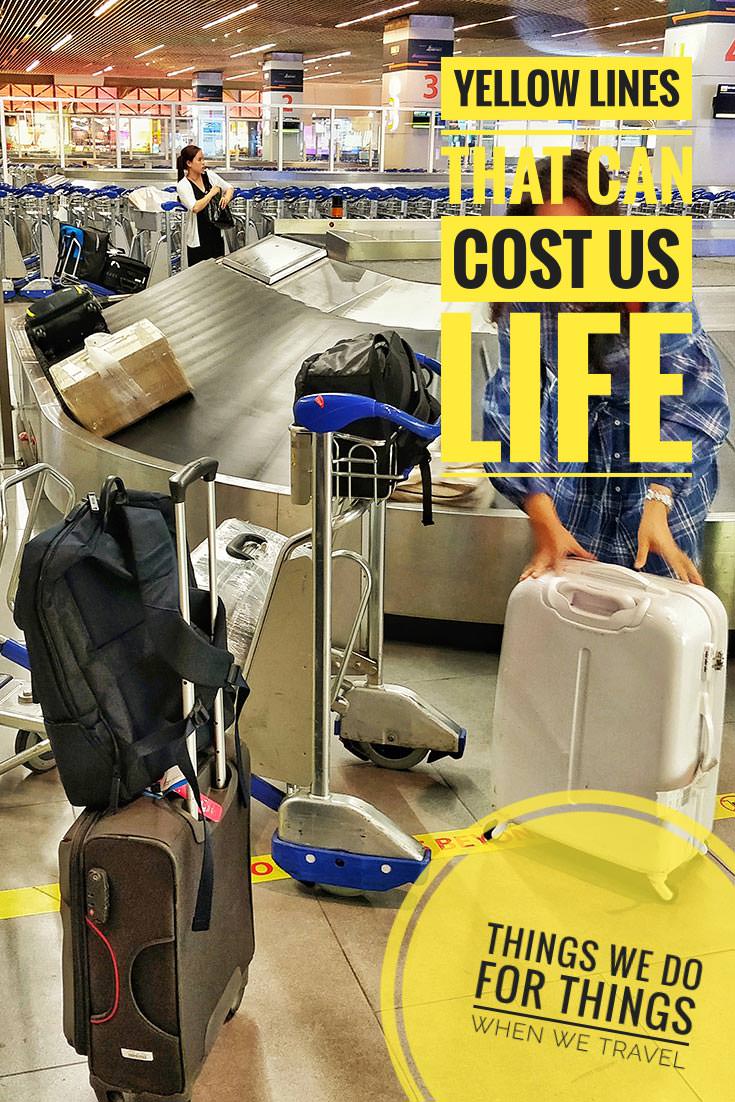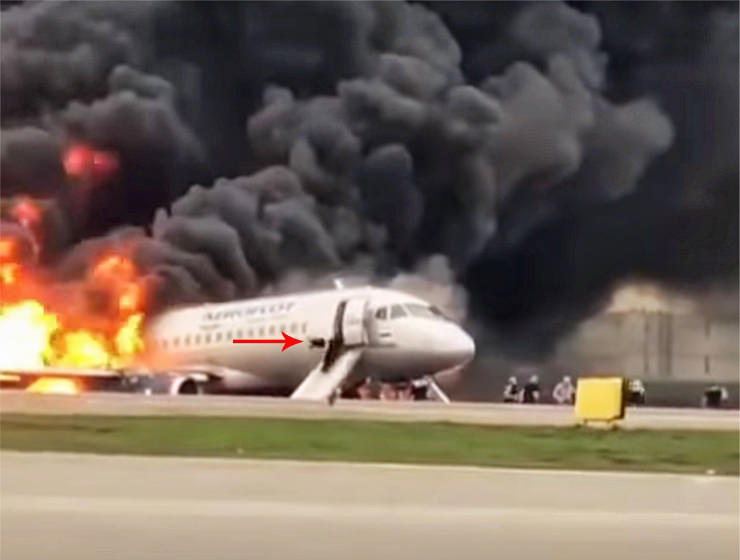The Aeroflot plane crash-landing on the Moscow runway killed 41 passengers on May 5th, 2019. The accident of the flight SU-1492 caused international fury, as the Superjet burst into flames only during the rollout and, despite the prompt reaction of the plane crew and ground staff, the death toll was still 52,6 %! It quickly turned out that passengers grabbing their hand luggage from the overhead compartments slowed down the evacuation process. Instead of 90 seconds, which is an industry-standard, the evacuation took six minutes! For the majority in the back of the plane, where the fire broke out, the flight ended up with a – death sentence!
This was certainly not the first example of how humans, confronted with a life-or-death situation, misjudge the circumstances. Surrounded by chaos, they execute intuitive decisions that are not only unfounded in reason but are utterly not intelligent. Is it just selfishness or are we conditioned to be the slaves of – stuff? Things we do for things are not only proof of how materialistic the contemporary world has become. They also show how easily our vision can be blurred when our lives are in real jeopardy. And after a plane crash, clear vision is all we need.
The reason for a plane crash can often lie in the miscalculation of the plane's weight. As passengers are getting heavier and heavier, and airlines are trying to fit in the plane as many of them as they can, is the risk of flying actually growing? Read all you need to know about flying while fat!
Death on a volcano

My memories of climbing Erta Ale Volcano in Ethiopia are still fresh. Ascending an active volcano with a permanent lava lake by night could have been just an atmospheric hiking choice. But this majestic piece of nature was located at the border with Eritrea, where kidnappings and killings of tourists occasionally did happen. A military escort was undoubtedly not just folklore. It was a hike that shouldn’t leave you indifferent.
Several months before my visit, on December 3rd, 2017, also Sunday, one German tourist misjudged the circumstances and paid it with his life. Walter Roepert was a 63-year-old medical doctor from Aalen. He visited the amazing volcano with a private guide, who survived the incident.
One version of the event says that assaulters attacked them because the guide was not from the Afar Region, and didn’t have the local approval to bring tourists. The other version of the story that the guides tell to Danakil Depression tourists explains it as a robbery attack. The German doctor supposedly didn’t want to hand over his possessions, and they shot him on the spot.
Whichever version was correct, the shots had to be a warning to show how serious the situation was. This experienced ear, nose and throat specialist did not succeed in reading the context. He was outnumbered and had nowhere to hide.
Flight accidents and stranger things

I didn’t climb Erta Ale on December 3rd, 2017, nor was I a direct witness of the Aeroflot plane crash on May 5th, 2019. I have no idea how would I react if the ultimate danger confronted me. We can all be smart in our comfy armchairs and call any behavior stupid, selfish, or materialistic. However, stressful situations do affect human judgment capacity. If we are willing to protect our possessions more than value our own lives, our brain chemistry is not functioning in the best way.
I already wrote how I ignored the lump that could’ve been diagnosed as cancer because I was busy with other “important” stuff. I do believe our minds cannot think straight when overwhelmed, even if the situation requires an urgent reaction. We can lose the feeling of priorities and act irrationally.
There is no doubt that Dmitry Khlebushkin, the passenger from seat 10C on an unfortunate Aeroflot flight, lost his sense of reality. The survivor of the plane crash was one of the people who blocked the aisle while saving his backpack, only to complain after the crash that he waited 40 minutes for the refund of his ticket and that, in the end, Aeroflot did not even provide it. Passengers behind row number 11 never had the chance to stand in front of the media microphones and complain about the refund. They burned to death!
There are some plane crash situations where access to luggage can save lives. Learn how Society of the Snow survived the 1972 accident in the Andes!
Plane crash history of luggage love
While it’s easy to call out this passenger for incredible selfishness, history confirms that the majority of us are the same. When confronted with the plane in flames, we save our luggage!
On 9 December 2011, Cathay Pacific flight B744 from Shanghai to Hong Kong experienced problems during taxiing for departure. The smoke appeared in the cabin, and the captain ordered the evacuation of the aircraft. Photographs of the event clearly showed that passengers were leaving the plane stuffed with personal belongings. Everyone on board was lucky to survive the incident.
On 6 July 2013, Asiana Airlines Flight 214 from Seoul to San Francisco crashed on the final approach. The tail section ripped off during the crash landing. As the fire was swallowing the aircraft, passengers were still grabbing their carry-on baggage before fleeing the burning wreckage. Some of them even had some heavy roll-aboard suitcases. Out of 307 persons on board, three died.
I do find it disgusting that these people all valued their hand luggage above the other passengers lives. pic.twitter.com/LTiDecgmMf
— Stuart McAllister (@Stu_McAllister) September 9, 2015
On 8 September 2015, British Airways flight 2276 from Las Vegas to London suffered an engine failure, prompting an aborted take-off. As they were evacuating the enflamed plane, passengers were carrying their purses, trolley bags, and shoulder bags, everything that they should have left behind. Nobody died.
On 3 August 2016, the Emirates flight 521 from Thiruvananthapuram to Dubai crashed while landing. One of the passengers took a video that captured the chaos of the evacuation. People were grabbing their luggage from the overhead lockers, even after the smoke started to fill the cabin! All 300 people on board survived.
Japan Airlines Flight 516 in 2024 showed how essential it is to follow the cabin crew's instructions during the emergency evacuation. Everybody survived because they left their baggage behind, but this event also reminded us of another essential safety measure on all flights - airplane seat belts.
Anger towards the plane crash survivors
The unfortunate Moscow plane crash was not the first, and it will probably not be the last example of how plane passengers lose reason in a state of panic. What made this flight different was only a high fatality rate.
The majority of these earlier accidents have produced instant anger on social media networks as well. But as most of them didn’t take any human victims, some new stories quickly replaced the scandal. The condemnation bubble automatically deflated.
We don’t know if anyone faced prosecution for not following the emergency evacuation protocol in plane accidents. Nobody spent a day in jail; nobody paid any fine. Jeopardizing the lives of others remained just some Twitter J’accuse, as airlines didn’t go to court with passengers. Maybe even out of fear that they would be the ones expected to pay the compensation.
But would the passengers of Aeroflot flight SU-1492 react differently if they had known that what they were doing was a criminal offense? Would they be running for their lives, or still running for their suitcases?
Moscow plane crash showed that fellow passengers could be one's worst enemy. Even if the majority of those in the rear end of the plane died, my belief that the last row of the aircraft has the best airplane seats has not been shattered.
Six reasons why you should leave your things behind in the event of a plane crash evacuation Internet comments show that people do not want to take airline rules for granted, and prefer to trust their judgment. Many of those who would take their belongings from the plane under the evacuation, claim that it doesn’t require much more action than not taking them, putting an accent on the value of things they travel with (which we could never compare with a value of human life). Still, there are perfectly sane reasons why your bags should stay behind you: 1. Taking items with you slows down the evacuation process, no matter how skillful you may be. 2. In the state of panic, objects or parts of objects could fall, block the aisles or hurt the people who would stumble on them while trying to escape the plane. 3. When fire and smoke appear on the plane, the air becomes very toxic. Taking items from the overhead bin or pulling them out from under the seat makes you consume more oxygen than needed, and lack of oxygen is what kills passengers in a burning plane. 4. Items you carry with you could puncture the evacuation slide, and make it unusable, killing everyone behind you. If one needs to remove high heels or even glasses before jumping on it, why would wheels of your bag or your duty-free (flammable and breakable) whiskey be harmless? 5. Bags can become dangerous once you jump on the slide – they can hit you, make you or fellow passengers unconscious, or turn into a dangerous obstruction at the base of the slide. 6. After plane crash, never trust your feeling of safety! Even if you can’t see the danger, it doesn’t mean one is not there. Emergency evacuation happens ONLY if there is a possibility that passengers could die in the aircraft. No, there is no time to grab a bag or take a video with your phone! You never know when this damaged vehicle full of fuel could explode!
Passengers + luggage = a recipe for chaos
If I’ve learned anything in a couple of decades of using world airports, it is that people with luggage most often behave like people with damaged brains. I don’t know if we can blame a different air pressure in the skies, dry plane air, or flight meals that are not nutritious enough, but once their plane lands and they go through all the border control procedures, it feels as if something destroys passengers’ brain functions. They cannot think clearly anymore!

Just spend some time at the baggage carousel at any airport for a while, and you’ll know what I mean! Even if the yellow line marks where passengers should stand, they do not notice it. Also, when they do, they do not see any connection between the efficiency of bag delivery and following the rules on where to stand.
In the perfect world, passengers stand one meter away from the baggage carousel, opening up the view to the actual bags arriving. When their bag comes close, they step behind the yellow line, take the bag and leave.
In the world as it is, passengers crowd the conveyor belt, with their airport trolleys occupying any free centimeter, blocking both the views of the carousel as well as space where one could unload one’s bags when they arrive. By wanting to reclaim their bag as soon as possible (and sooner than others), passengers switch off their brains and do everything they can to not retrieve the bag as soon as they could.
To promote the best ways to travel via airports, TSA is often cracking hilarious jokes in their social media. Find out how humor can be an educational safety marketing tool!
Stuff makes us stupid
Turning off the use of reason is not an exclusivity of air travel.
Recently, I traveled by boat from Coron to El Nido in Palawan, the Philippines. When we reached the final port, passengers rushed to exit the vessel and flocked at the area designated for the luggage delivery. They filled the seafront until the last inch, leaving no space for the boat crew to disembark the bags.
None of these passengers showed any intention of stepping back, so their bags could be delivered. They were afraid of losing the “best spot” for grabbing their bag, even if their stand was actively disabling the delivery.
If reclaiming our bags makes us stupid in everyday situations, how could it be different in a burning plane?
If the obsession with reclaiming our bags makes us stupid in the most serene situation of traveling on a tropical island, is it such a surprise that in the condition of panic produced by the airplane in flames, our brains can additionally deteriorate and become less functional?
Would we leave our bags in the burning plane only if the overhead bins were charged with electricity? Would that protect us from stupid actions we were wired to do? Some commenters were indeed advocating in recent years that overhead bins should be automatically locked in case of emergency. But would that stop our inclination toward not thinking clearly?
There are certain areas of the plane that seem privileged with access to the evacuation path. Should you book extra legroom seats? Could bulkhead seats meet your needs?
Goodbye, things
Fumio Sasaki, the author of the Japanese bestseller book “Goodbye, things”, advocates for a minimalist lifestyle. He says: “It’s not as though you feel satisfied after collecting a certain amount of stuff. Instead, you keep thinking about what you’re missing.”
Human attachment to things is a fascinating and insatiable beast. We clutter our lives with stuff. We do it at home, and we do it when we travel too.
You are probably aware of how you overpack for every trip. Then you end up not wearing all those dress combinations that you fantasized about when you were packing.
My friend recently packed five different sporting outfits, imagining that he would garnish his holiday with jogging mornings. He ended up using one of these outfits. Once. His packing eyes were not in touch with reality.
When speaking about myself, I rent a whole apartment in Zagreb, Croatia, mainly to have a place for my stuff. This is the most expensive part of my traveling budget – renting a flat I rarely sleep in! The truth is I don’t need as much stuff, as well as my stuff does not require such living space. My stuff would be as fine in some storage room without water or heating or cable TV, all the things I regularly pay for, while living the life of a nomad. Why do I do that? It’s not logical, and I’m aware of that.
Our brains are not always logical. I guess we identify stuff with value because we are aware that we had to invest energy and work to obtain these things. Not appreciating things would mean that we do not appreciate our own efforts.
Things as roommates or travel companions
Trained to identify stuff with value, we have a hard time dissociating the two. It took a lot of effort for me to learn that I can live for months from a suitcase that is less than 20 kilos. It took the experience to learn that I do not need two power banks or an extra charger, just in case. While I fancy the idea of minimalism, I know I’m not there yet. But the truth is that most of us are not.
Sasaki says: “Whether we live alone or with other people, few acknowledge the presence of another roommate. This roommate is named ‘Things’ and the space that ‘Things’ occupies is typically a lot larger than the space people have for themselves.”
Things literally take our living space. Passengers of the Moscow flight discovered this in the worst possible way. They were cremated alive because things took over the mindset of the people in front of them.
Need more advice on how to survive a plane crash? Check these tips from the pilots!
If we are married with stuff, can we file for a divorce?
The question “Can we survive without stuff?” is a weird one, as the answer after these examples is undeniable. German would be sending postcards from some new volcano if he only gave his camera away. Several more passengers behind row 11 of the Moscow flight would be complaining about the refund if the passenger sitting on 10C left his backpack on the plane.
These travelers are gone, and nobody will resurrect them. They died in possibly survivable situations. The carry-on bags saved from the plane crash will be forgotten, or their value will decrease with time. This stuff will eventually also die, and will not get resurrected.
If we would understand things we do for things and invest the same type of energy for fellow humans or even ourselves, the matter of life or stuff would never be a dilemma. Nobody smart gives one’s life for an object.
Did you like this article?
Pin it for later!




Thoughtful post, thanks. Having downsized from a single family home to a townhouse and now looking at extended travel in a 13-foot travel trailer, I can attest that getting rid of stuff is a liberating action.
It definitely is! While longterm traveling made me learn I can live with less, my brain is still stuck with paying that flat rental for keeping old stuff 🙂
However, I’m determined to do that part of liberation for my wallet too! Organizing myself this summer!
Great information, Ivan, and something I’ve never thought about in all our years of perpetual travel. My husband and I have been traveling the globe, for the last 8 years, and have been forced to live the minimalist lifestyle that you mentioned. Since we are Americans traveling mostly in Europe, we are only allowed to stay in most countries for a maximum of 90 days. We have learned to travel with an average bag of 20 kilos each. Now, we are planning to get residency in the Republic of Georgia, and a long-term apartment rental, which will enable us to still travel, with just carry-on luggage. Georgia is very beautiful and very cheap, by the way. We’ll be paying $450.00, a month for rent. We’ve been to Zagreb, many times, and really love Croatia, but like many other countries, it wasn’t a place we could get residency. Didn’t mean to write a book, but was just really interested in your story, and will share to FB.
Thanks for your thoughts, Christina!
I’ve never been to Georgia, but I did hear great things about it! I hope to visit it soon!
Also, for your minimalist lifestyle, I hope that a long-term apartment rental will not be too big temptation to collect stuff here and there, just because it will be easier. You have something really precious there, keep it! As they say, collecting memories is always a better option! I wish you all the best for your travels!
The way we accumulate stuff we don’t need is something that the business world encourages. After all, clothing can last for years, yet many people buy the latest fashion year after year and even season by season. We gain self-worth based on our possessions, which is a very sad statement. I’d be all for the overhead bins being lockable. People would still grab their underseat bags, but at least they’re smaller!
I have a feeling that, if automatic locking of overhead bins would happen, passengers would still try to open them by force, or at least take their stuff out even before the locking happens, if they could predict it.
Human psychology is so hard to grasp!
Thanks for your thoughts, Rachel! It is true that the modern world encourages us to spend more and gain more. New clothes are such temporary satisfaction for those who can afford them. I guess they do have some healing effect, but I wonder what these people do with their old clothes, as they could be buying new stuff without accumulating the old one, right?